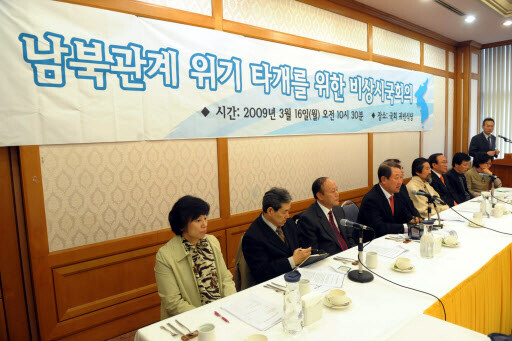hankyoreh
Links to other country sites 다른 나라 사이트 링크
Opposition parties and civic groups urge government to revamp its N. Korea policy

The Democratic Party and three other opposition parties, religious leaders and civic and social groups held an “emergency meeting for a breakthrough in the crisis of inter-Korean relations” at the National Assembly on Monday, urging a complete about-face in North Korea policy from the government.
This meeting, the first held since the meeting’s preparatory committee was formed in late January, was attended by officials from four opposition parties, including Democratic Party Supreme Council member Park Joo-sun, Democratic Labor Party lawmaker Kang Ki-kab, Renewal of Korea Party lawmaker Yu One-il and New Progressive Party Co-President Roh Hoe-chan, as well as religious leaders such as Monsignor Kim Byeong-sang and Jinbo Korea head Rev. Lee Kang-shil, and more than 20 figures from civic and social groups.
A statement to the public was issued Monday by more than 1,000 individuals from various fields, including the meeting participants. The statement said that “the primary cause for inter-Korean relations racing toward crisis lies in the South Korean government’s effective ignorance of agreements made between South and North Korean leaders and the continuation of a policy of antagonism toward the North.” The statement also urged a complete policy turnaround to find a solution for the crisis in inter-Korean relations.
The writers of the statement specifically called upon the South Korean government to make clear its intentions of following through on the June 15 and October 4 South-North joint declarations and to show the sincerity of their intentions for dialogue by abandoning their enforcement of the North Korean Human Rights Act and resuming projects for inter-Korean exchange and cooperation, including tourism at Mount Geumgang. They also called for an easing of military tensions on the Korean Peninsula through enforcement of the West Sea peace plan agreed upon in the October 4 Declaration, and for the resumption of unconditional humanitarian support.
In the future, the emergency meeting plans to hold a public hearing for citizens and a national debate, with the participation of experts and citizens from various walks of life, after which it will announce plans for action at the national level aimed at a solution to the crisis in inter-Korean relations. They also intend to continue observing advances in the inter-Korean situation and will tour areas such as Gwangju, Daejeon and Busan beginning in April, pursuing popular assemblies and emergency meetings among all citizens.
Please direct questions or comments to [englishhani@hani.co.kr]
Editorial・opinion
![[Column] Season 2 of special prosecutor probe may be coming to Korea soon [Column] Season 2 of special prosecutor probe may be coming to Korea soon](https://flexible.img.hani.co.kr/flexible/normal/500/300/imgdb/original/2024/0426/3317141030699447.jpg) [Column] Season 2 of special prosecutor probe may be coming to Korea soon
[Column] Season 2 of special prosecutor probe may be coming to Korea soon![[Column] Park Geun-hye déjà vu in Yoon Suk-yeol [Column] Park Geun-hye déjà vu in Yoon Suk-yeol](https://flexible.img.hani.co.kr/flexible/normal/500/300/imgdb/original/2024/0424/651713945113788.jpg) [Column] Park Geun-hye déjà vu in Yoon Suk-yeol
[Column] Park Geun-hye déjà vu in Yoon Suk-yeol- [Editorial] New weight of N. Korea’s nuclear threats makes dialogue all the more urgent
- [Guest essay] The real reason Korea’s new right wants to dub Rhee a founding father
- [Column] ‘Choson’: Is it time we start referring to N. Korea in its own terms?
- [Editorial] Japan’s rewriting of history with Korea has gone too far
- [Column] The president’s questionable capacity for dialogue
- [Column] Are chaebol firms just pizza pies for families to divvy up as they please?
- [Column] Has Korea, too, crossed the Rubicon on China?
- [Correspondent’s column] In Japan’s alliance with US, echoes of its past alliances with UK
Most viewed articles
- 1Samsung subcontractor worker commits suicide from work stress
- 2Division commander ordered troops to enter raging flood waters before Marine died, survivor says
- 3No good, very bad game for Korea puts it out of Olympics for first time since 1988
- 4‘We must say no’: Seoul defense chief on Korean, USFK involvement in hypothetical Taiwan crisis
- 5[Column] Season 2 of special prosecutor probe may be coming to Korea soon
- 6Is N. Korea threatening to test nukes in response to possible new US-led sanctions body?
- 7Korea’s 1.3% growth in Q1 signals ‘textbook’ return to growth, says government
- 8US overtakes China as Korea’s top export market, prompting trade sanction jitters
- 9[Column] Has Korea, too, crossed the Rubicon on China?
- 10[Column] ‘Choson’: Is it time we start referring to N. Korea in its own terms?